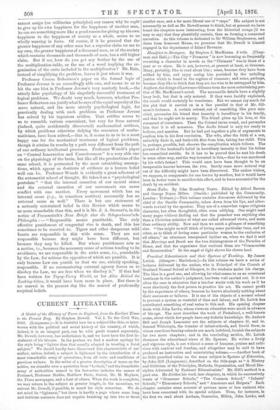Handfast to Strangers. By Stephen J. MacKenna. 3 vols. (Chap-
man and Hall.)—The City " Promoter " is now becoming as frequently recurring a character in novels as the " Claimant " was in those of a year or so since. He is not however, at present at least, so tiresome. Many, probably, like to read about him ; some, because they have been robbed by him, and enjoy seeing him punished by the unfailing justice which is found in the regions of romance ; and some, perhaps, because they like to think that they are too wise to be entrapped by him. Anyhow, the doings of Lawrence Gilmore form the most entertaining por- tion of Mr. MacKenna's novel. The mercantile details have a slightly hazy look, but that is only natural. If they were lucidly explained, the result would certainly be wearisome. But we cannot say much for the plot that is carried on in a line parallel to that of Mr. Gil- more's fortunes. A certain colonel, out of something like pure mis- chief, persuades his friend that insanity is hereditary in his family, and that he ought not to marry. The friend gives up his love, at the command of conscience. Then the Colonel turns round, and persuades him that it is all nonsense. The docile friend is only too ready to believe, and marries. But he had put together a pile of arguments to confirm him in his first resolution. The wife, after the birth of a son, unluckily finds it, and forthwith flies from him, taking her child. This is, perhaps, possible, but observe the complication which follows. The ground of the husband's belief in hereditary insanity is that his father has committed suicide. So it has to be proved that he met his death in some other way, and the way invented is this,—that he was murdered by his wife's father! This would once have been thought to be an insuperable barrier between the two. Surely some more natural way out of the difficulty might have been discovered. The author wishes, we suppose, to compensate for one horror by another, but it would have been in better taste to sacrifice this effect, and to have accounted for the death by an accident.


































 Previous page
Previous page